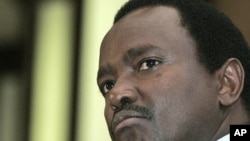Nearly two months of diplomatic negotiations led by Kenyan Vice President Kalonzo Musyoka appears to have had little impact as the United Nations Security Council is set to reject Kenya’s request for deferral of two trials at the International Criminal Court.
Musyoka, along with a team of Kenyan Members of Parliament and Ministers worked to convince members of the Security Council that Kenya be allowed to try those suspected of being behind post-poll violence in 2008.
While Musyoka claimed to have the support of certain members of the Council, the United States, France and the United Kingdom - permanent members with veto power - all rejected the request Friday. The decision - which took place during an informal meeting - has dashed the hopes of Kenya’s leaders.
But, Gilbert Bitti, a senior legal advisor at the ICC says there is still hope that Kenya may be able to hold the proceedings in country. He says the ICC is governed by a principle that favors local proceedings to trials at The Hague.
“According to article 19 of the Rome Statute the Kenyan government can now challenge the admissibility of those cases," explained Bitti. "However, the challenge has to be based on actual national proceedings. Actual national proceedings, prosecutions against the same persons and for the same crimes. You cannot challenge the admissibility of cases on the basis of future proceedings."
Those accused, including the deputy prime minister, a former-minister and a former-police chief, have been summoned to appear at The Hague on April 7 and 8.
In the peace deal that followed in early 2008 it was agreed people accused of crimes would face justice in Kenya or at the ICC in The Hague.
But after Kenyan MPs blocked moves to set up a local tribunal, the ICC's chief prosecutor Luis Moreno-Ocampo accused six high-profile Kenyans in December of murder, deportations and persecutions.
Despite its intentions, Kenya has yet to set up any mechanism to bring suspects of the post-election violence to justice. In 2009, the Truth, Justice and Reconciliation Commission was established to investigate alleged crimes during the chaos, but an ethics scandal surrounding Chairman Bethuel Kiplagat has arrested the group’s work.
In a recent interview with VOA, the director of the Nairobi-based International Center of Policy and Conflict, Ndungu Wainaina, rejected the government’s promise to try suspects in Kenya.
“It is not possible in this country, maybe in another country but not in Kenya. It is as practical as that,” Wainaina said.
More than 1,300 people were killed and 300,000 displaced in two months of ethnic violence following a disputed election between President Mwai Kibaki and Prime Minister Raila Odinga.
Finance Minister Uhuru Kenyatta, former Higher Education Minister William Ruto and Head of Civil Service Francis Muthaura are among those accused by the Court of plotting and organizing the mayhem.
Kenya Seeks Another Way to Stall Hague Proceedings




